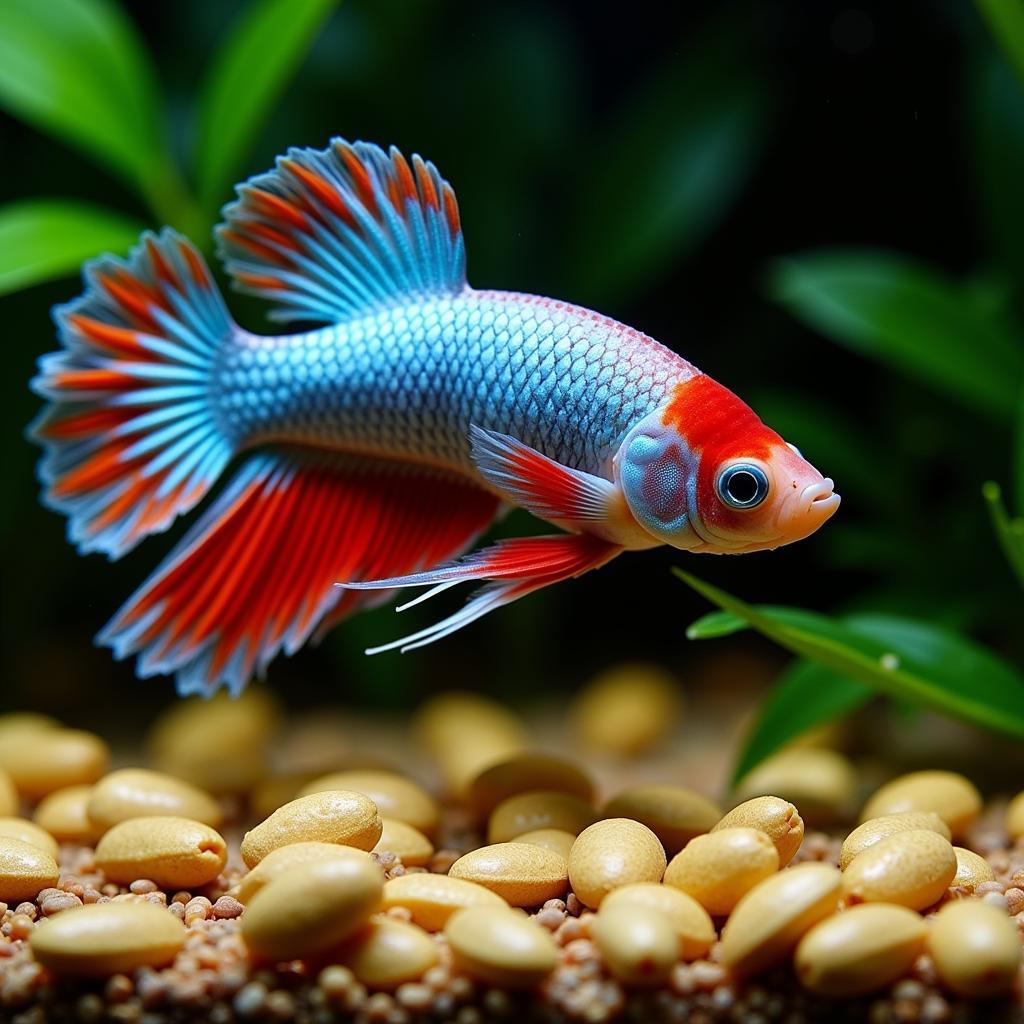Feeding your vibrant betta friend correctly is crucial for their health and longevity. Knowing How Much Food For A Betta Fish isn’t just about throwing some pellets in; it’s about understanding their specific needs and providing a balanced diet. Overfeeding can lead to various health problems, while underfeeding can cause weakness and stunted growth. Let’s dive into the details of betta nutrition.
Understanding Betta Fish Dietary Needs
Betta fish are carnivores, thriving on a diet rich in protein. In their natural habitat, they primarily consume insects and small invertebrates. This means their digestive systems are designed to process protein-rich foods, not plant-based matter. While some commercial betta foods contain plant-based fillers, these should not be the primary ingredient. A high-quality fish food hikari can be a great choice.
How Much to Feed a Betta Fish Daily?
The golden rule of thumb is to feed your betta what they can consume in 2-3 minutes. This typically equates to 2-4 small pellets, twice a day. However, the exact amount depends on factors like the pellet size, your betta’s age, activity level, and even the water temperature. Overfeeding is a common mistake, so start with a small amount and observe your fish.
 Betta Fish Consuming Pellets
Betta Fish Consuming Pellets
Choosing the Right Betta Fish Food
Selecting the right food is just as important as the quantity. Look for what is the best betta fish food that is specifically formulated for bettas, with high-quality protein sources as the main ingredients. Avoid foods with excessive fillers or artificial colorings.
Types of Betta Food
There are several types of betta food available, including pellets, flakes, freeze-dried foods, and even live fish food. Pellets are generally considered the best option as they maintain their shape in water, reducing the risk of water contamination. Freeze-dried and live foods can be offered as occasional treats, adding variety to your betta’s diet.
Signs of Overfeeding and Underfeeding
Knowing how much food for a betta fish also means being able to recognize the signs of incorrect feeding.
Overfeeding
- Swollen belly
- Constipation
- Cloudy water
- Uneaten food sinking to the bottom
Underfeeding
- Lethargy
- Loss of color
- Thin appearance
- Clamped fins
If you notice any of these signs, adjust the feeding amount accordingly. Remember, it’s better to slightly underfeed than overfeed.
“Overfeeding is one of the most common mistakes new betta keepers make,” says Dr. Emily Carter, aquatic veterinarian. “It’s essential to understand that these tiny creatures have small stomachs and require a surprisingly small amount of food.”
Tips for Feeding Your Betta Fish
- Establish a regular feeding schedule.
- Remove any uneaten food after a few minutes.
- Soak pellets for a few seconds before feeding to soften them.
- Vary the diet occasionally with treats like bloodworms or daphnia.
- Consider neon fish food if you also have neon tetras in your tank, ensuring both species get appropriate nutrition.
Conclusion
Knowing how much food for a betta fish is key to their well-being. By providing the right amount and type of food, you can ensure your betta lives a long, healthy, and vibrant life. Remember to always observe your fish and adjust their feeding as needed. Using high quality fish food optimum will also help.
FAQ
- How often should I feed my betta fish? Twice a day is generally recommended.
- What are the best betta fish pellets? Look for pellets specifically formulated for bettas, with high-quality protein sources.
- Can I overfeed my betta fish? Yes, overfeeding is a common problem and can lead to health issues.
- What are signs of a healthy betta fish? Vibrant colors, active swimming, and a healthy appetite are signs of a healthy betta.
- What should I do if my betta fish is not eating? Check the water parameters and consider offering a different type of food.
- Can I feed my betta fish flakes? While pellets are generally preferred, flakes can be used as part of a varied diet.
- How long can a betta fish go without food? A healthy betta can survive for a few days without food, but it’s not recommended.
Common Scenarios
- My betta fish is always hungry: This could be a sign of boredom. Try adding more enrichment to their tank, like plants and hiding places.
- My betta fish spits out its food: The food might be too large or not palatable. Try soaking the pellets or offering a different type of food.
- My betta fish has a swollen belly: This is often a sign of overfeeding. Reduce the amount of food and monitor their condition.
Further Reading
Check out our articles on “live fish food” and “what is the best betta fish food” for more information on betta nutrition.
When you need support, please contact us at Phone Number: 02437655121, Email: minacones@gmail.com Or visit our address: 3PGH+8R9, ĐT70A, thôn Trung, Bắc Từ Liêm, Hà Nội, Việt Nam. We have a 24/7 customer service team.